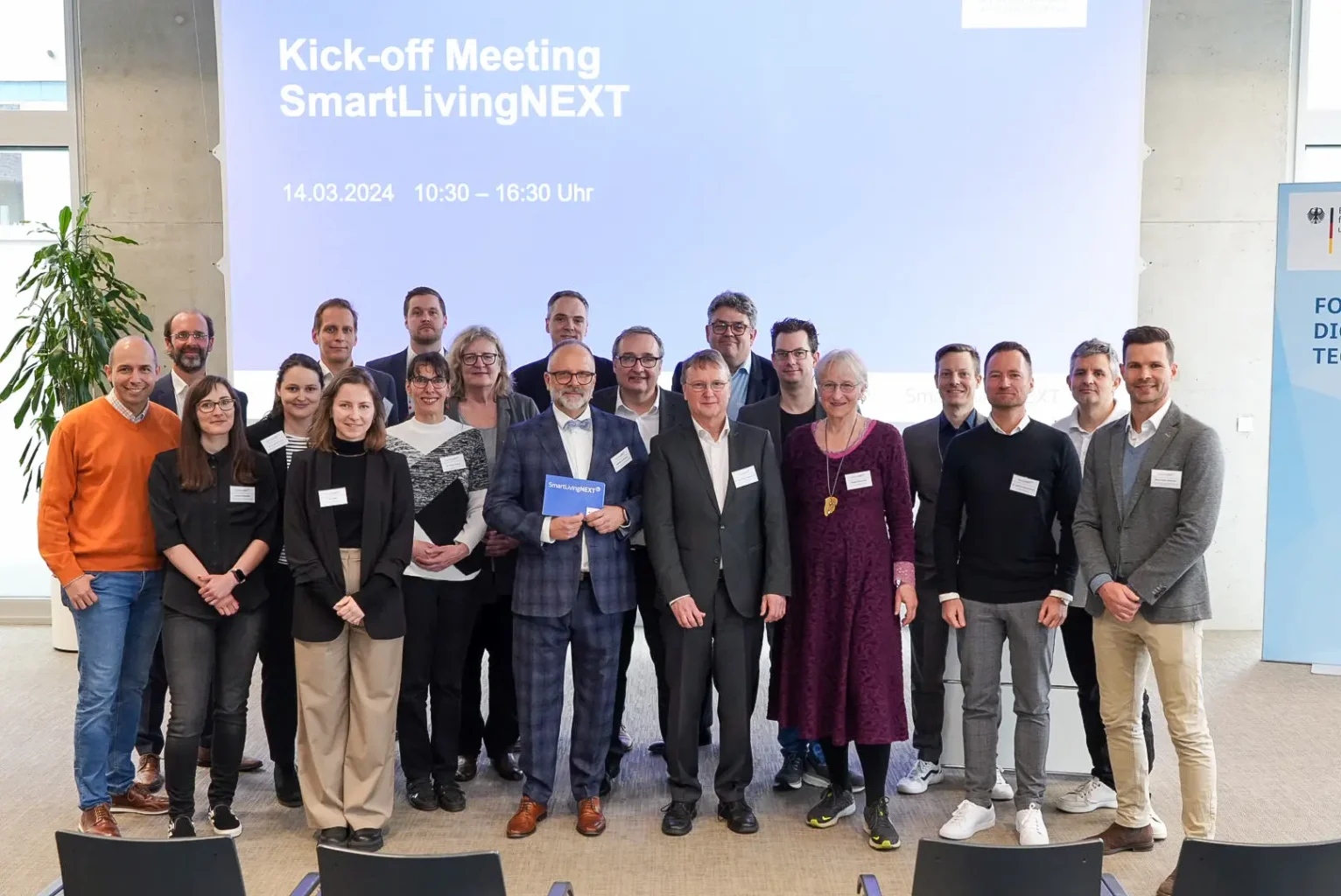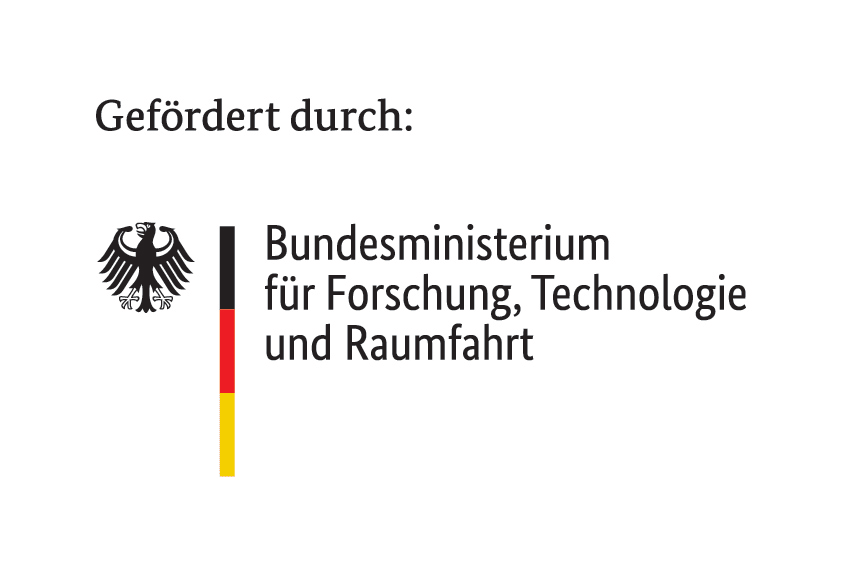14. March 2024
Launch of the SmartLivingNEXT technology program funded by the German Federal Ministry for Economic Affairs and Climate Action (BMWK)
The SmartLivingNEXT kick-off event will take place in the heart of Berlin at the Forum Digitale Technologien. More than 80 experts from the smart living community, the building automation and digitalization industry, science and industry associations will take part. There, the interdisciplinary project teams have the opportunity to get to know each other as well as the overarching goal and vision of SmartLivingNEXT.

“With SmartLivingNEXT, we are laying the foundation for a universal data ecosystem for the smart living market,” says Axel Voß, Head of the Digital Technology Development Division at the Federal Ministry for Economic Affairs and Climate Protection (BMKW). “The aim is to address as many relevant fields of application as possible in order to underline the universality of the ecosystem and provide a strong impetus for the German economy and all users. We hope that this model will be widely accepted in Germany and Europe after the end of the funding phase.”
The SmartLivingNEXT technology program includes the ForeSightNEXT flagship project and six other research projects that aim to take existing residential buildings to a new level in the areas of energy efficiency and assistance. This will be made possible by practical smart services developed by the projects on the basis of the SmartLivingNEXT Dataspace. This ensures that a broad portfolio of applications is created that is attractive to other market participants.
In the SmartLivingNEXT technology program’s flagship project, the core technology, in particular the SmartLivingNEXT Dataspace and the SmartLivingNEXT Toolbox, is being developed and tested with its own applications. The core is a secure access point to all relevant smart living data in residential buildings. Its open and slim structure allows the development of intelligent smart living services to be simplified and made more sustainable.Residential buildings. “Proven digital technologies already used in residential buildings can be integrated and combined in the data ecosystem,” says Michael Schidlack, Principal Researcher at the Electrical Engineering Research Association at ZVEI e. V. and consortium leader of the SmartLivingNEXT flagship project. The semantic dataspace concept pursued in the project leaves data in its original environment and provides the SmartLivingNEXT community with AI-supported basic services for data analysis, forecasting and pattern recognition. The ForeSightNEXT flagship project provides the necessary catalogs, tools and connectors.
About SmartLivingNEXT:
The six other research projects taking part in the launch event as part of the SmartLivingNEXT technology program are:
BIM-4-CARE
BIM-4-CARE records and harmonizes the knowledge gained from experience in care and the various perspectives of relevant stakeholders in home redesign. The project aims to improve the planning of care requirements, conversion measures and the technical implementation and interoperability of system installations. “We are excited by the diversity and potential of SmartLivingNEXT that we have seen throughout the day today,” says Konstatin Krahtov, CEO of Open Experience GmbH and consortium leader of BIM-4-CARE. “These projects represent a wide-ranging commitment to cutting-edge technological research and innovation.”
COMET
The COMET project, which is part of the lead project, collects (labeled) user data and develops a crowdsourcing app that enables the management of data access authorizations and data provision. This also makes it possible to retrieve individually tailored information and statistics (e.g. relating to energy consumption). “In the project, we are developing and implementing consumer empowerment mechanisms that allow consumers to decide for themselves which data they want to provide and how it should be used,” says Dr. K. Valerie Carl from the Goethe University Frankfurt am Main and consortium leader at COMET. “In future, consumers should be given the opportunity to participate in the SmartLivingNEXT ecosystem as data owners and thus provide their data voluntarily.”
DulTeasy
The project focuses on the development of an Assistance Dataspace (ADS), as well as applications and basic services based on it. This ADS contains all the data, interfaces and systems required for individual assistance services. The everyday assistance use case uses the ADS to implement internal and external services and integrates a wide variety of system environments for this purpose. As part of the activity detection use case, the corresponding basic service is enriched with iMSys data and NILM procedures. “The use cases of the SmartLivingNEXT projects are not only milestones for the future of smart living, but also proof of our determination to develop innovative solutions that improve people’s well-being and quality of life,” emphasizes Florian Böhle from easierLife, consortium leader of DulTeasy.
ExpliCareNEXT
ExpliCareNEXT focuses on simplifying care processes and aims to ease staff shortages through technical assistance equipment in the living environment and artificial assistance by enabling unskilled workers to carry out high-quality care activities using natural language instructions. This is intended to counteract the growing shortage of skilled workers in Germany. “For us, the SmartLivingNEXT kick-off event marks the beginning of an important project in which we have the opportunity to help solve a major social challenge and, in combination with other pioneering projects, play a decisive role in shaping the care and living of the future,” says Enrico Löhrke, Managing Director of inHaus GmbH and consortium leader at ExpliCareNEXT.
FAME4ME
FAME4ME analyzes the possibilities of using AI-supported algorithms for sustainable energy management in smart living and building environments. In particular, we are investigating how different user groups react to individualized dynamic electricity tariffs.
“In the project, we will define customer groups and use cases for which a user-friendly platform will be designed in order to later communicate price signals and recommendations for action,” explains Christoph Kost from the Institute for Solar Energy Systems ISE of the Fraunhofer-Gesellschaft and consortium leader of FAME4ME. The project supports the overarching climate neutrality goals, the efficient use of resources and applications of innovative digitalization technologies.
GAiST
Within the project, more than 30 homes will be equipped with sensors over a period of 24 months to collect and analyze health-related information. This will be connected to the SmartLivingNEXT platform and a hospital information system (HIS). In this way, patients, carers and doctors can be supported in their activities to make life in their own four walls more liveable. “The combination of artificial intelligence, advanced sensor technology and smart home components is intended to promote health-oriented living that meets the needs of older people and helps them to better cope with everyday challenges,” promises Nizar Müller from the Hospital zum Heiligen Geist and consortium leader at GAiST. By using open source and medical and industrial standards, the project aims to reduce costs and personnel requirements in the healthcare sector.
Category:
SmartLivingNEXT
Stay informed about the latest developments around SmartLivingNEXT:
